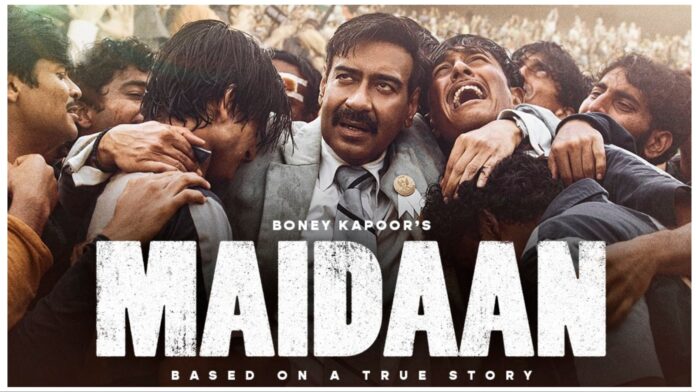Zee Studios, Bayview Projects and Fresh Lime Films’ Maidaan (UA) is a biopic of Indian football coach Syed Abdul Rahim who tutored the Indian football team and was its manager from 1950 until his demise in 1963. He is regarded as the architect of modern Indian football.
Syed Abdul Rahim (Ajay Devgan) is the coach of the Indian football team which has been performing miserably. A heated meeting of the Football Federation, which pins the blame on Rahim, ends in Rahim being given the responsibility of selecting the team himself as he is held answerable for the performance of the team. The team blossoms under his guidance. But a stage comes when the Federation once again blames him for the under-performance of the Indian team. There is politics galore in the Federation which now decides to hire the services of a new coach. This bad news coincides with another bad news in Rahim’s personal life. Then, one day, Rahim approaches the Federation once again with a request to be appointed the coach over again. Much to the chagrin of the Federation president, Shubhankar (Rudranil Ghosh), Syed Abdul Rahim is reappointed the team coach. How while fighting his own personal battle, he steers the Indian football team to victory in the Asian World Cup is what the latter part of the story is all about.
Saiwyn Quadros, Akash Chawla and Arunava Joy Sengupta have written a story by borrowing liberally from the Indian football coach’s real life. The story inherently has a lot of drama and emotions, mostly on the football field and in related areas. The screenplay, by Saiwyn Quadros, with additional screenplay by Aman Rai, Atul Shahi and Amit Ravindernath Sharma, concentrates on Syed Rahim more than anybody else, so much so that even the football players who win the Asia World Cup don’t get enough footage for them to make a place in the viewers’ hearts. In other words, although the players have been given importance whenever they excel on the field, they don’t become heroes in the audience’s eyes because the only single person the drama concentrates on is Syed Abdul Rahim. This is one drawback of the screenplay because the face of not a single player of the Indian team makes a place in any corner of the viewers’ hearts. Secondly, there are no light moments in the screenplay, making the drama very heavy. A few light moments are so class-appealing (for example, Rahim’s wife announcing that she has “passed away” with 50% marks) that they will be lost on the masses. Even the family drama is not very fully and completely written for it to have the desired emotional impact. The absence of light moments and the not-a-completely-emotionally-moving family drama are underlined in the first half because it is weak. The screenplay concentrates almost completely on the game post-interval — and to advantage. Therefore, although the first half is only of approximately 70 minutes, it appears long-drawn and boring as compared to the super-exciting second half of more than 110 minutes. The post-interval portion in general and the field scenes in particular are so exciting and so tension-ridden that the viewers would often miss a heartbeat. The thrill is often edge-of-the-seat but there are also some moments which touch the heart and move the audience to tears. For instance, the conversation between the father (Rahim) and his son (Hakim) after the latter has been excluded from the Indian team, the scene in which the earlier goal-keeper gives his gloves to the new goal-keeper, the scene in which the new coach raises his hand first in the Federation meeting room, the scene in which India is declared the Asian champion, these are all scenes which give the viewers goosebumps and evoke tears. Ritesh Shah’s dialogues, with additional dialogues by Siddhant Mago, are very real and heartfelt.
Ajay Devgan does an extraordinary job as Syed Abdul Rahim. He is first-rate and conveys a lot of emotions through his eyes and body language. His acting in the scenes of his despair and the scenes showing him super-tense during the football matches is extraordinary. This is easily one of Ajay’s career-best performances. Priyamani is wonderful as Saira but a more vulnerable Saira (character-wise) would’ve evoked more sentiments. Gajraj Rao lives the role of Roy Choudhry. He evokes hatred which is the need of his character. Baharul Islam lends fantastic support as Anjan. Rudranil Ghosh performs outstandingly as Shubhankar. Rishab Joshi makes his presence amply felt as S.A. Rahim’s son, Hakim. Vijay Maurya and Abhilash Thapliyal are natural as the Indian commentators. Ishtiyak Khan passes muster as assistant coach Hari. Devyansh Tapuriah is endearing as the younger Hakim. Nitanshi Goel hardly gets scope as S.A. Rahim’s daughter. Aayesha Vindhara is cute as the younger version of S.A. Rahim’s daughter. Meenal Patel has her moments as S.A. Rahim’s mother. Zaheer Mirza (as Morarji Desai) is effective. Amartya Ray (as Chuni Goswami), Davinder Singh (as Jarnail Singh), Tejas Ravishankar (as Peter Thangraj), Tanmay Bhattacharjee (as Pradyut Burman), Madhur Mittal (as Fortunato Franco), Manandeep Singh (as Trilok Singh), Arko Das (as Prashanto Sinha), Jayant V. (as Arumai Nayagam), Aaman Munshi (as Arun Ghosh), Raphael Jose (as D. Ethiraj), Vishnu G. Varrier (as O. Chandrashekhar), Sushant Waydande (as Tulsidas Balaram), Prajwal Maski (as Yusuf Khan), Sai Kishore (as D.M.K. Afzal), Amandeep Thakur (as Ram Bahadur), Chaitanya Sharma (as P.K. Banerjee), Aryan Bhowmik (as Neville D’Souza), Namokaran M. (as football player), Pavitra Sarkar (as the Bengal team coach), Raj Kundal (as the Punjab coach), Shruthy Menon (as the jazz club singer), Debashish Naha, Aloke Ranjan Choudhury, Aloke Sengupta, Amitaba Ghosh, Amitabha Gupta, Arya Gupta, Debashish Mitra, Subhashis Chakraborty, Janardan Ghosh (all nine as Federation members), Krishna Sajnani (as Morarji Desai’s assistant), Thunchanok Tuangmokda (as the Thailand team coach), Komsan Roekdee (as the Korean team coach), Lassana Keita (as the coach), Nikola Vitorovic (as the football coach/translator), Marko Nikolic (as the French team coach), Paul Spurrier (as the Australian team coach), and the rest are adequate.
Amit Ravindernath Sharma’s direction is very good but he should’ve taken more care on two counts — he should’ve provided more relief through light moments in a drama which is three hours long, and he should have made heroes out of at least four or five of the football players who brought glory to India. A.R. Rahman’s music is average. A couple of chartbusters would’ve made a world of a difference. Manoj Muntashir Shukla’s lyrics are meaningful but not of the kind which would become very popular. A.R. Rahman’s background music is extraordinary. Tushar Kanti Ray’s cinematography is top-class. The cinematography of the sports scenes, by Fyodor Lyass, Tassaduq Hussain and Christopher Reed, is simply splendid. R.P. Yadav’s action and stunt scenes are exciting. Khyatee Mohan Kanchan’s production designing is of a fantastic standard. Dev Rao Jadhav’s editing is sharp. The sports scenes have been beautifully edited by Shahnawaz Mosani.
On the whole, Maidaan has an extraordinary second half but a very ordinary first half. It will do well at the ticket counters on the strength of the fast-paced and thoroughly enjoyable post-interval portion but it will miss being the blockbuster it could’ve been, because of the boring first half. Collections are bound to pick up phenomenally due to strong word of mouth.
Released on 10-4-’24 at Inox (2 shows (paid previews); in daily 8 shows from 11-4-’24) and other cinemas of Bombay by Zee Studios. Publicity: excellent. Opening: ordinary. …….Also released all over. Opening was below expectations almost everywhere.





























